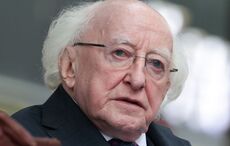The Irish Ambassador in London has confirmed that they will attend the commemorations at London’s Cenotaph on Remembrance Day. Although government officials have attended the commemorations in recent years this is the first time they have been invited to lay a wreath.
Ambassador Daniel Mulhall will attend the commemorations alongside Queen Elizabeth and the Royal family, Prime Minister David Cameron and other leading Britons to mark the “contribution and shared sacrifice made by many thousands of Irish men and women who have served in the British Armed Forces".
This move is seen as a sign of improved Anglo-Irish relations. Previously Ireland’s Prime Minister Enda Kenny has laid wreaths in Enniskillen, while Eamon Gilmore, while serving as Deputy Prime Minister laid wreaths at the Cenotaph in Belfast.
In a statement Mulhall said, “I am pleased to accept the invitation of the UK Government to lay a wreath in memory of the 50,000 Irish who died and the 200,000 who served in World War One.
"The invitation arose following the successful reciprocal State Visits of recent years and also in the context of other events which have taken place around the First World War as part of the Government's Decade of Commemorations program, marking significant centenaries."
The UK's Secretary of State for Culture, Media and Sport, Sajid Javid said, "Throughout the First World War Irish servicemen stood side by side with men and women from across Great Britain and the Commonwealth.
"As we commemorate the centenary of the start of the war it is right we remember our nations' shared sacrifice."
It is expected that in coming years the Irish government will receive similar invitations to take part in the commemorations in London.
Close to 200,000 Irish soldiers served in the First World War. Many of these men returned to find their home at war with the British. After the Irish Free State was formed, in 1922, many of the Irish survivors were shunned by their own countrymen. Despite this thousands more Irish volunteered in the Second World War even though Ireland was officially neutral.




Comments